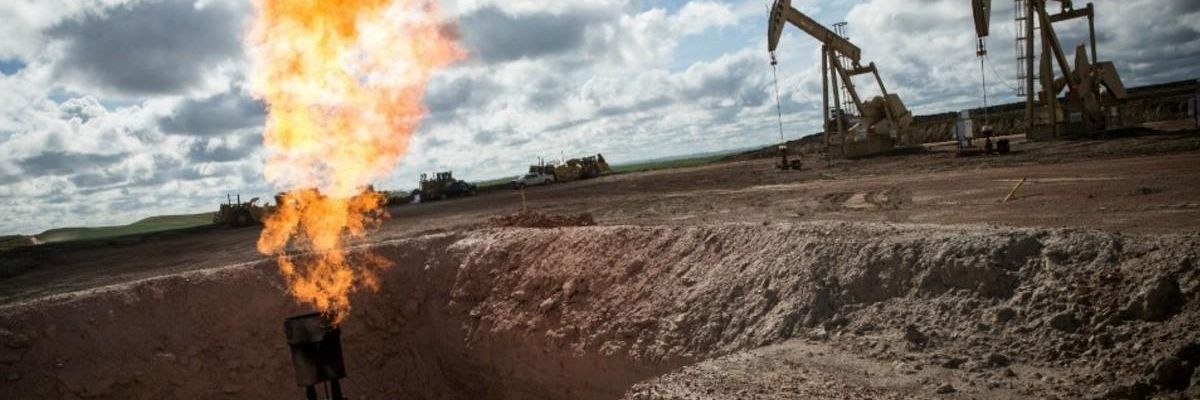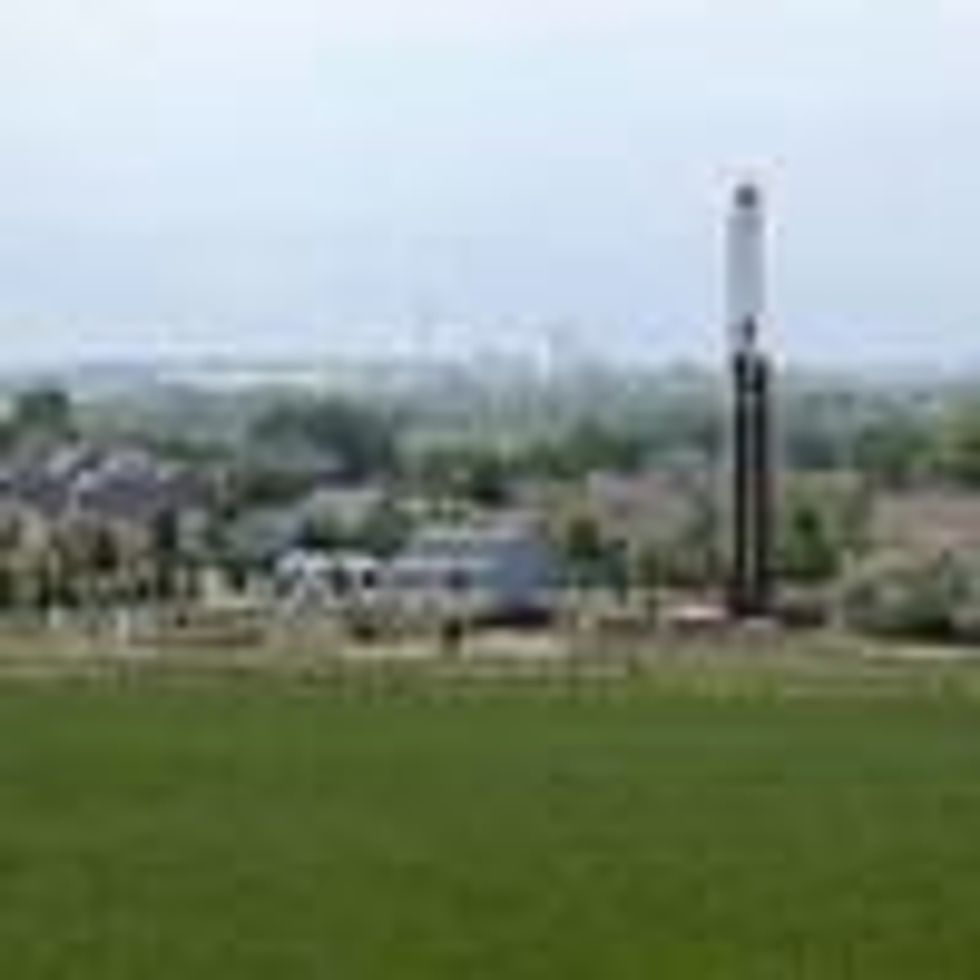

SUBSCRIBE TO OUR FREE NEWSLETTER
Daily news & progressive opinion—funded by the people, not the corporations—delivered straight to your inbox.
5
#000000
#FFFFFF
To donate by check, phone, or other method, see our More Ways to Give page.


Daily news & progressive opinion—funded by the people, not the corporations—delivered straight to your inbox.

A gas flare is seen at an oil well site outside Williston, North Dakota. (Photo: Andrew Burton/Getty Images)
Combining findings from more than 2,000 scientific and government studies, a report published Thursday details how hydraulic fracturing has "dire impacts on public health and the climate."
" Fracking swings a wrecking ball at our climate."
Physicians for Social Responsibility and Concerned Health Professionals of New York (CHPNY) released the eighth edition of their Compendium of Scientific, Medical, and Media Findings Demonstrating Risks and Harms of Fracking, a comprehensive examination of the state of the hydraulic fracturing industry and its impacts.
"The scientific evidence reveals conclusively that fracking causes widespread and severe harm to people and the climate," Sandra Steingraber, CHPNY co-founder and compendium co-author, said in a statement.
"For over 10 years, individual studies have demonstrated impacts in multiple areas, including toxic air pollution, water contamination, radioactive releases, earthquakes, methane emissions, and much more," she added. "The compendium takes stock of all the science together, which shows that continuing and expanding fracking brings with it a grave cost."
The report reveals that:
According to the publication:
In sum, the vast body of scientific studies now published on hydraulic fracturing in the peer-reviewed scientific literature confirms that the climate and public health risks from fracking are real and the range of environmental harms wide. Our examination uncovered no evidence that fracking can be practiced in a manner that does not threaten human health directly or without imperiling climate stability upon which human health depends.
"People, nurses, and doctors across the United States have been pointing to harms from drilling and fracking for well over a decade," said Barbara Gottlieb, environment and health program director at Physicians for Social Responsibility. "Now there is clear and overwhelming scientific evidence showing that fracking makes people sick, degrades the environment, and imperils the climate."
"From a public health perspective and a climate perspective, stopping fracking is imperative," she stressed.
Related Content

Dr. Kathleen Nolan of Physicians for Social Responsibility and Concerned Health Professionals of New York, said, "States and countries that have banned fracking are leading the way to a stable and healthy climate future, preventing poisonous fracking chemicals from causing birth defects, cancer, heart disease, asthma and pneumonia, diseases of other organs and tissues, and early death."
"Banning fracking also prevents induced earthquakes and greatly reduces emissions of methane, carbon dioxide, toxic gases, and particulate matter into our atmosphere," she added. "We know what must be done: Now we must do it--and do it quickly."
Dear Common Dreams reader, The U.S. is on a fast track to authoritarianism like nothing I've ever seen. Meanwhile, corporate news outlets are utterly capitulating to Trump, twisting their coverage to avoid drawing his ire while lining up to stuff cash in his pockets. That's why I believe that Common Dreams is doing the best and most consequential reporting that we've ever done. Our small but mighty team is a progressive reporting powerhouse, covering the news every day that the corporate media never will. Our mission has always been simple: To inform. To inspire. And to ignite change for the common good. Now here's the key piece that I want all our readers to understand: None of this would be possible without your financial support. That's not just some fundraising cliche. It's the absolute and literal truth. We don't accept corporate advertising and never will. We don't have a paywall because we don't think people should be blocked from critical news based on their ability to pay. Everything we do is funded by the donations of readers like you. Will you donate now to help power the nonprofit, independent reporting of Common Dreams? Thank you for being a vital member of our community. Together, we can keep independent journalism alive when it’s needed most. - Craig Brown, Co-founder |
Combining findings from more than 2,000 scientific and government studies, a report published Thursday details how hydraulic fracturing has "dire impacts on public health and the climate."
" Fracking swings a wrecking ball at our climate."
Physicians for Social Responsibility and Concerned Health Professionals of New York (CHPNY) released the eighth edition of their Compendium of Scientific, Medical, and Media Findings Demonstrating Risks and Harms of Fracking, a comprehensive examination of the state of the hydraulic fracturing industry and its impacts.
"The scientific evidence reveals conclusively that fracking causes widespread and severe harm to people and the climate," Sandra Steingraber, CHPNY co-founder and compendium co-author, said in a statement.
"For over 10 years, individual studies have demonstrated impacts in multiple areas, including toxic air pollution, water contamination, radioactive releases, earthquakes, methane emissions, and much more," she added. "The compendium takes stock of all the science together, which shows that continuing and expanding fracking brings with it a grave cost."
The report reveals that:
According to the publication:
In sum, the vast body of scientific studies now published on hydraulic fracturing in the peer-reviewed scientific literature confirms that the climate and public health risks from fracking are real and the range of environmental harms wide. Our examination uncovered no evidence that fracking can be practiced in a manner that does not threaten human health directly or without imperiling climate stability upon which human health depends.
"People, nurses, and doctors across the United States have been pointing to harms from drilling and fracking for well over a decade," said Barbara Gottlieb, environment and health program director at Physicians for Social Responsibility. "Now there is clear and overwhelming scientific evidence showing that fracking makes people sick, degrades the environment, and imperils the climate."
"From a public health perspective and a climate perspective, stopping fracking is imperative," she stressed.
Related Content

Dr. Kathleen Nolan of Physicians for Social Responsibility and Concerned Health Professionals of New York, said, "States and countries that have banned fracking are leading the way to a stable and healthy climate future, preventing poisonous fracking chemicals from causing birth defects, cancer, heart disease, asthma and pneumonia, diseases of other organs and tissues, and early death."
"Banning fracking also prevents induced earthquakes and greatly reduces emissions of methane, carbon dioxide, toxic gases, and particulate matter into our atmosphere," she added. "We know what must be done: Now we must do it--and do it quickly."
Combining findings from more than 2,000 scientific and government studies, a report published Thursday details how hydraulic fracturing has "dire impacts on public health and the climate."
" Fracking swings a wrecking ball at our climate."
Physicians for Social Responsibility and Concerned Health Professionals of New York (CHPNY) released the eighth edition of their Compendium of Scientific, Medical, and Media Findings Demonstrating Risks and Harms of Fracking, a comprehensive examination of the state of the hydraulic fracturing industry and its impacts.
"The scientific evidence reveals conclusively that fracking causes widespread and severe harm to people and the climate," Sandra Steingraber, CHPNY co-founder and compendium co-author, said in a statement.
"For over 10 years, individual studies have demonstrated impacts in multiple areas, including toxic air pollution, water contamination, radioactive releases, earthquakes, methane emissions, and much more," she added. "The compendium takes stock of all the science together, which shows that continuing and expanding fracking brings with it a grave cost."
The report reveals that:
According to the publication:
In sum, the vast body of scientific studies now published on hydraulic fracturing in the peer-reviewed scientific literature confirms that the climate and public health risks from fracking are real and the range of environmental harms wide. Our examination uncovered no evidence that fracking can be practiced in a manner that does not threaten human health directly or without imperiling climate stability upon which human health depends.
"People, nurses, and doctors across the United States have been pointing to harms from drilling and fracking for well over a decade," said Barbara Gottlieb, environment and health program director at Physicians for Social Responsibility. "Now there is clear and overwhelming scientific evidence showing that fracking makes people sick, degrades the environment, and imperils the climate."
"From a public health perspective and a climate perspective, stopping fracking is imperative," she stressed.
Related Content

Dr. Kathleen Nolan of Physicians for Social Responsibility and Concerned Health Professionals of New York, said, "States and countries that have banned fracking are leading the way to a stable and healthy climate future, preventing poisonous fracking chemicals from causing birth defects, cancer, heart disease, asthma and pneumonia, diseases of other organs and tissues, and early death."
"Banning fracking also prevents induced earthquakes and greatly reduces emissions of methane, carbon dioxide, toxic gases, and particulate matter into our atmosphere," she added. "We know what must be done: Now we must do it--and do it quickly."